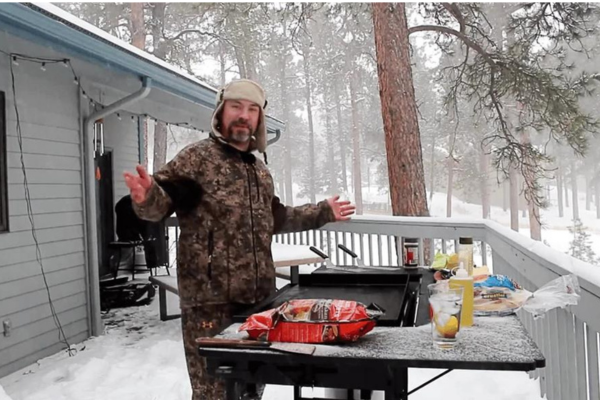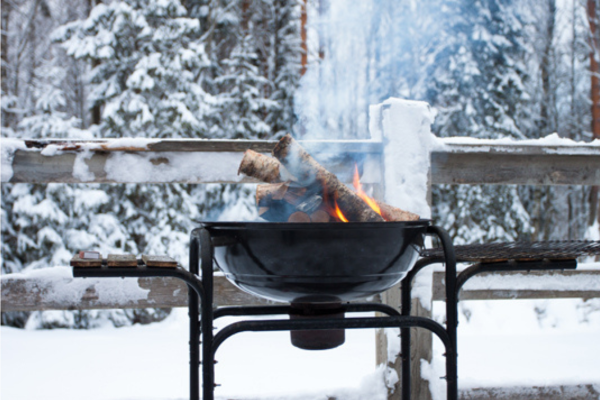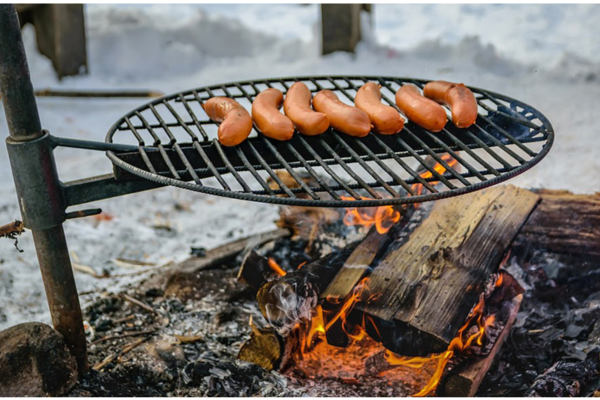Picture this: It’s a crisp winter morning, snowflakes gently falling from the sky, and a tantalizing aroma wafting through the air.
You step outside onto your patio, bundled up in your favorite cozy sweater, and there it is—your trusty grill, waiting to work its magic.
Yes, my fellow grill enthusiasts, today I embark on a flavorful journey as I will explore the question: Can you grill in the winter?
As an avid grill aficionado, I’ve often found myself pondering the possibility of extending my grilling adventures into the colder months.
And let me tell you, the answer is a resounding YES! Winter is no reason to bid farewell to the joys of outdoor cooking.
In fact, grilling in the winter adds a touch of excitement and novelty to our culinary escapades.
There’s something enchanting about standing amidst a winter wonderland, wielding tongs in hand, as mouthwatering aromas mingle with the frosty air.
It’s an experience that elevates the art of grilling to new heights, promising a unique blend of flavors and an opportunity to showcase your culinary prowess.
Now, you might be wondering if it’s safe to fire up the grill when the temperatures drop. Rest assured, with the right precautions, grilling in cold weather can be both safe and enjoyable.
By following a few simple guidelines, you can savor delicious grilled delights while embracing the beauty of the winter season.
In this comprehensive guide, I’ll share my personal insights, expert tips, and answers to some frequently asked questions to equip you for a successful winter grilling adventure.
So, gather ’round, my fellow grill enthusiasts, and let’s dive into the enchanting world of grilling in the winter!
Read More: What Temperature Is Medium Heat On A Grill
Can You Grill in the Winter?

The winter season often conjures up images of cozy nights by the fireplace and hearty meals enjoyed indoors.
But what about grilling? Can you really fire up the grill and savor those smoky flavors in the midst of snowflakes and chilly air? The answer is a resounding yes!
Contrary to popular belief, winter is not a barrier to your grilling adventures. In fact, it opens up a world of culinary possibilities and it can elevate your outdoor cooking game to new heights.
With a little preparation and the right mindset, grilling in the winter can be an exhilarating and delicious experience.
One of the benefits of winter grilling is the unique flavor profiles that can be achieved. The cold weather adds a delightful smokiness and complexity to grilled dishes that simply can’t be replicated during other seasons.
Imagine sinking your teeth into a perfectly seared steak, its juices mingling with the crisp winter air. The flavors take on a whole new dimension, making each bite a revelation.
Moreover, grilling in the winter allows you to break free from the monotony of indoor cooking. It offers a refreshing change of scenery and a chance to embrace the beauty of the season.
Picture yourself bundled up in warm attire, surrounded by the serene tranquility of a snow-covered landscape. The sizzle of the grill and the aroma of grilling food create an enchanting symphony that blends culinary artistry with nature’s own masterpiece.
Of course, grilling in winter does require some adjustments. The colder temperatures may affect cooking times, requiring a bit more patience and vigilance.
It’s important to monitor the grill and make necessary modifications to ensure that your food cooks evenly and to perfection.
Additionally, keeping your grill protected from wind and snow can help maintain a consistent cooking environment.
So, my fellow grill enthusiasts, don’t let the winter chill discourage you. Bundle up, gather your favorite ingredients, and embark on a culinary adventure and this will awaken your taste buds and warm your soul.
Winter grilling awaits, ready to tantalize your senses and create unforgettable culinary memories.
Is It Safe to Grill in Cold Weather?
When it comes to grilling in cold weather, safety is a top priority. It’s essential to ensure a safe and enjoyable grilling experience, even when the temperatures plummet.
Let’s address some common concerns and discuss the precautions you should take.
First and foremost, it’s crucial to maintain proper ventilation while grilling in cold weather. Never attempt to bring your grill indoors, as this can lead to a buildup of dangerous carbon monoxide gas.
Instead, position your grill outdoors in a well-ventilated area, away from any flammable materials.
To ensure a safe grilling environment, take the time to clear away any snow or ice surrounding your grill.
This prevents slips and falls while also minimizing the risk of a fire caused by melting snow coming into contact with the grill.
Another safety consideration is using a meat thermometer to check the internal temperature of your grilled items.
This is especially important during the winter when cooking times may vary due to colder ambient temperatures.
By properly monitoring the internal temperature of your food, you can ensure it reaches the recommended levels for safe consumption.
Additionally, dressing appropriately for the weather is vital. Bundle up in warm clothing, including insulated gloves, to protect yourself from the cold.
Long-handled grilling tools will allow you to maneuver the food on the grill while keeping a safe distance from the heat source.
Will Winter Affect Grilling?

Grilling in the winter brings its own set of challenges, mainly due to the colder temperatures and potential weather conditions.
It’s essential to understand how winter can affect the grilling process and be prepared to make adjustments. Let’s delve into some key considerations for winter grilling.
One significant factor to keep in mind is the impact of cold temperatures on cooking times.
As the temperature drops, it may take longer for your grill to reach and maintain the desired heat level.
Patience is key during this time, as you may need to adjust your cooking times accordingly. It’s always a good idea to use a reliable meat thermometer to ensure your food reaches the recommended internal temperature for safe consumption.
Another factor to consider is the presence of wind, which can affect the cooking process. The wind can cause heat loss and make it challenging to maintain consistent temperatures on the grill.
To minimize the impact of wind, position your grill strategically, such as against a wall or using a windbreak. This will help shield the grill and create a more stable cooking environment.
Additionally, winter weather conditions like snow and ice may require extra precautions.
Before firing up the grill, ensure that the cooking area is clear of any snow or ice, which can cause slipping hazards and affect the grill’s performance.
You can also invest in a grill cover or shelter to protect the grill from the elements when it’s not in use.
Adapting your cooking techniques can also enhance your winter grilling experience. For instance, using a cast iron skillet or a smoker box can help retain heat and infuse your dishes with smoky flavors.
These alternative methods can be particularly useful in colder temperatures when it may take longer for the grill to heat up.
By understanding and embracing the potential challenges of winter grilling, you can overcome them with confidence and ensure that your grilled creations are nothing short of spectacular.
How to Grill in the Winter

Grilling in the winter requires a bit of extra preparation and some adjustments to your usual grilling routine.
By following these step-by-step instructions, you can conquer the winter grilling challenge and create mouthwatering dishes that will warm both your heart and your taste buds.
Prepare the Grill
Before you start grilling, ensure that your grill is clean and in good working condition.
Remove any residue or debris from previous use, and check that all the components are functioning properly.
A well-maintained grill is the foundation for successful winter grilling.
Strategic Positioning
Position your grill in a sheltered area or against a wall to minimize the impact of wind. This helps maintain a consistent cooking temperature and prevents excessive heat loss.
By creating a shield against the elements, you can ensure that your food cooks evenly and efficiently.
Ignite with Care
When lighting your grill, avoid using accelerants such as lighter fluid in cold weather. Instead, opt for a chimney starter or electric ignition system.
These methods provide a safer and more reliable way to ignite the grill without any risk of flare-ups or harmful chemicals.
Adjust Cooking Times and Temperatures
Remember that colder temperatures can affect cooking times. Plan accordingly and allow for longer cooking periods.
Keep a close eye on your food and use a meat thermometer to ensure it reaches the appropriate internal temperature.
Adjust the heat settings as needed to maintain consistent cooking.
Explore Alternative Grilling Methods
Winter is the perfect time to experiment with alternative grilling techniques. Consider using a cast iron skillet or a smoker box to add extra flavors to your dishes.
These methods can help retain heat and infuse your food with that irresistible smokiness.
With these guidelines in mind, you’re now equipped to embark on your winter grilling adventures.
Let the aroma of sizzling meat and the joy of outdoor cooking in the winter fill your senses.
Tips for Grilling in Winter
Grilling in the winter may require a few extra considerations, but with the right tips and tricks, you’ll be well-prepared to conquer the cold and create culinary masterpieces.
Here are some valuable tips to enhance your winter grilling experience:
Bundle Up: Dress warmly and layer up to protect yourself from the cold temperatures. Insulated gloves, a cozy hat, and a thick jacket will keep you comfortable while tending to the grill.
Don’t forget to wear sturdy, non-slip footwear to ensure your safety on potentially icy surfaces.
Preheat Your Grill: In colder temperatures, it takes longer for the grill to reach the desired heat level.
Allow extra time for preheating to ensure the grill grates are hot enough for that perfect sear. This step is crucial for achieving those beautiful grill marks and locking in the flavors.
Optimize Grilling Space: When grilling in winter, make the most of your grill space by preparing side dishes or vegetables alongside the main course.
Utilize grill baskets or skewers to cook a variety of items simultaneously. This not only saves time but also adds a delightful assortment of flavors to your meal.
Use Thermally Insulated Tools: Invest in thermally insulated grilling tools to protect your hands from cold metal.
These tools are designed to withstand high temperatures while providing insulation against the cold. They ensure a comfortable and safe grilling experience, even in chilly conditions.
Maintain a Lid-Lifting Strategy: During winter grilling, try to minimize the number of times you lift the lid.
Each time you open the lid, heat escapes, and the cooking temperature drops. This can significantly impact cooking times and result in unevenly cooked food.
Keep a watchful eye on your dishes and use a meat thermometer to monitor progress without lifting the lid unnecessarily.
Plan for Winter-Friendly Recipes: Consider selecting recipes that work well with winter grilling. Choose heartier cuts of meat, such as roasts or thick steaks, which can withstand longer cooking times.
Opt for recipes that incorporate seasonal ingredients and robust flavors to complement the winter ambiance.
By following these tips, you’ll be well-prepared to conquer the challenges of winter grilling and delight your taste buds with mouthwatering creations.
Embrace the winter wonderland as your grilling playground and let your culinary skills shine.
Can I Use A Gas Grill In Winter?
Absolutely! Gas grills are designed to withstand different weather conditions, including cold temperatures. Just make sure to follow the safety guidelines and maintain proper ventilation.
What Temperature Can You Grill In The Winter?
You can grill in the winter at any temperature, but keep in mind that colder temperatures may require longer cooking times.
Monitoring the internal temperature of your food with a meat thermometer is crucial for achieving the desired doneness.
Why Do People Cover Their Grill In Winter?
People cover their grills in winter to protect it from snow, ice, and other winter elements. This helps prevent damage and prolongs the lifespan of the grill.
Remember to cover your grill when it’s not in use, ensuring it stays in top condition for your next grilling session.
Do Gas Grills Work In Cold Weather?
Yes, gas grills work in cold weather. However, it’s important to follow the manufacturer’s instructions and take precautions to maintain proper ventilation and fuel flow.
The colder temperatures may affect the performance of gas grills, so be prepared to adjust cooking times and monitor the grill closely.
Final Remarks
Finally, the winter season should not deter you from indulging in the joys of grilling. With the right mindset, preparation, and a few adjustments, you can embrace the enchantment of grilling in the winter.
The cold temperatures and snow-laden landscapes add a unique touch to your culinary creations, elevating the flavors to new heights.
By ensuring safety measures, such as proper ventilation and clear cooking areas, you can grill in the winter without any concerns.
Adjusting cooking times, utilizing windbreaks, and exploring alternative grilling methods will help you overcome the challenges posed by the colder weather.
Dressing warmly, preheating the grill adequately, and employing thermally insulated tools will keep you comfortable and enhance your grilling experience.
So, my fellow grill enthusiasts, don’t let the winter freeze your culinary aspirations. Embrace the opportunity to grill in the winter, relish the flavors that come alive in the cold air, and create unforgettable culinary moments.
Share your winter grilling experiences and tips in the comments below, and let’s continue our journey of culinary exploration together. Happy winter grilling!
Leave a Reply